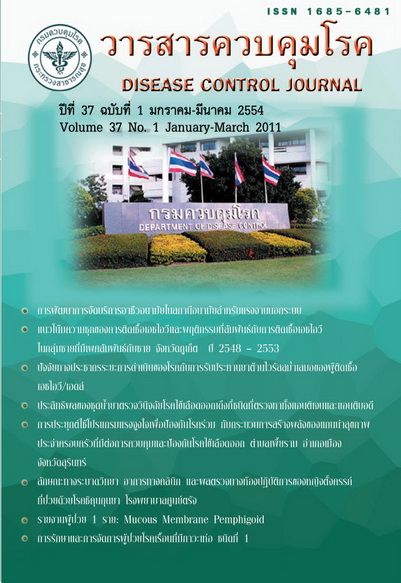Application of Protection Motivation Theory and Empowerment Program on Dengue Hemorrhagic Fever Control for Family Health Leaders in Tambon Pearram, Mueang District, Surin Province
Keywords:
Protection Motivation, Empowerment, Family Health LeadersAbstract
Dengue hemorrhagic fever (DHF) was one of the important health problems across Thailand. At present DHF spreadec throughout every village of Thailand including Tumbon Paerram, Surin province. This quasi-experimental research aimed to explore the effects of Protective Motivational Theory and Empowerment Program for family health leaders on the Dengue hemorrhagic fever control. The study was carried out with family health leaders who were selected purposively from two villages. Sixty family health leaders participated in an experimental group receiving the Protective Motivational Theory interventions and the Empowerment Program, and the other 60 samples were in a comparison group. Data were collected by interview and survey which conducted before and after the experiment. Data were then analyzed using descriptive statistics and for testing hypothesis with the paired t-test and independent t-test. The results showed that the experimental group significantly gained knowledge of Dengue hemorrhagic fever, better perception of severity and risk of Dengue hemorrhagic fever, comply with protective recommendations,. The experiment group also showed these outcomes more than the comparison group (p<0.05). In addition, the larva index of the experimental village was lower than before conducting experiment program, and less than comparison village. In conclusion, the application of Protective Motivational Theory and the Empowerment Program had changed the knowledge, perception and practice in dengue hemorrhagic fever prevention of the participants. Therefore, the health organizations involved should apply the methodology for controlling and preventing Dengue hemorrhagic fever in other places of Surin province.
Downloads
References
2. ณัฐพร มีสุข. การมีส่วนร่วมของชุมชนในการควบคุมลูกน้ำยุงลายในอำเภอเมือง จังหวัดชลบุรี. วิทยานิพนธ์วิทยาศาสตรมหาบัณฑิต. สาขาสุขศึกษาและพฤติกรรมศาสตร์. บัณฑิตวิทยาลัย: มหาวิทยาลัยมหิดล, 2544.
3. ศูนย์ควบคุมโรคติดต่อนำโดยแมลงที่ 5.3 สุรินทร์. สรุปรายงานการติดตามการดำเนินควบคุมป้องกันโรคไข้เลือดออกอำเภอเมืองสุรินทร์. (เอกสารอัดสำเนา), 2551
4. ธานี นามม่วง. ปัจจัยที่ส่งผลต่อพฤติกรรมการป้องกันโรคไข้เลือดออกของประชาชนในอำเภอกาบเชิง จังหวัดสุรินทร์.วิทยานิพนธ์ศิลปศาสตรมหาบัณฑิต. โปรแกรมวิชาสังคมศาสตร์เพื่อการพัฒนา. มหาวิทยาลัยราชภัฎสุรินทร์, 2548.
5. จิรพร พลหงษ์. การพัฒนาศักยภาพผู้นำชุมชนในการเสริมสร้างพฤติกรรมป้องกันโรคเลปโตสไปโรซิส ด้วยกระบวนการเรียนรู้แบบมีส่วนร่วม ตำบลธาตุทอง อำเภอภูเขียว จังหวัดชัยภูมิ. วิทยานิพนธ์ ส.ม.: มสธ, 2546.
6. นิตยา เพ็ญศิรินภา. เทคนิคการสร้างพลังส่งเสริมสุขภาพ.วารสารการส่งเสริมสุขภาพและอนามัยสิ่งแวดล้อม, 2544.
7. พชร หาสุข. การมีส่วนร่วมของชุมชนในการป้องกันโรคไข้เลือดออกสถานีอนามัย เครือข่ายหนองแวงใต้-กูปอ อำเภอเมือง จังหวัดกาฬสินธุ์. วิทยานิพนธ์ ส.ม. :มหาวิทยาลัยมหาสารคาม, 2549.
8. จำรัส ศรีปัตตา. การสร้างชุมชนในการควบคุมลูกน้ำยุงลาย. วิทยานิพนธ์ สม. มหาวิทยาลัยมหาสารคาม, 2547.
9. สำเนา แวงวรรณ. การควบคุมลูกน้ำยุงลายโดยชุมชนมีส่วนร่วม. วิทยานิพนธ์ ศศ.ม. ขอนแก่น: มหาวิทยาลัยขอนแก่น, 2540.
10.ศิวรา เธียระวิบูลย์. การประยุกต์ทฤษฎีแรงจูงใจเพื่อป้องกันโรคร่วมกับแรงสนับสนุนทางสังคมในการปรับเปลี่ยนพฤติกรรมการป้องกันโรคไข้เลือดออกของกลุ่มแม่บ้าน อำเภอเมือง จังหวัดปทุมธานี. วิทยานิพนธ์ วท.ม.กรุงเทพฯ: มหาวิทยาลัยมหิดล, 2542.
11.จันทิมา วิชกูล. ผลของการสร้างพลังแกนนำครอบครัวโดยใช้กระบวนการเรียนรู้แบบมีส่วนร่วมต่อการควบคุมและป้องกันโรคไข้เลือดออก.วิทยานิพนธ์พยาบาลศาสตรมหาบัณฑิต. มหาวิทยาลัยบูรพา, 2551
12.นารีรัตน์ ทวีฉลาด. ผลของการจัดโปรแกรมสุขศึกษาร่วมกับการให้แรงสนับสนุนทางสังคม ต่อการรับรู้และพฤติกรรมการป้องกันโรคไข้เลือดออกของแกนนำสุขภาพประจำครอบครัวอำเภอปราสาท จังหวัดสุรินทร์. วิทยานิพนธ์ ส.ม.: มหาวิทยาลัยมหาสารคาม 2547.
Downloads
Published
How to Cite
Issue
Section
License
Articles published in the Disease Control Journal are considered as academic work, research or analysis of the personal opinion of the authors, not the opinion of the Thailand Department of Disease Control or editorial team. The authors must be responsible for their articles.






